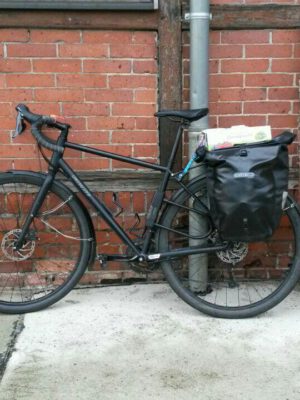How does the shown object point to a better world?
This is my bike. More precisely: That was my bike, because unfortunately it was stolen from me recently. In a better world this would not have happened, which would have had many advantages: First, the person(s) who decided to steal the bike by force would not have had to do so. They would have had no reason to do so because they would have been fine. Secondly, I would not have had to think in categories of “possession” and mark my bicycle as “in possession” by locking it in the banister with a hard to pick lock, because I could have shared it and relied on it being treated with care and coming back to me. Thirdly, more people would have enjoyed their bike and our banister would have remained undamaged.
Anyway…
My bicycle is somehow the first thing that comes to mind when I think of a better world, the second would probably have been a vegetable garden or an urban community garden. Back to the bicycle: for me it still means to be independent and to be able to ride off at any time — a means to be able to relate to something, to connect with something: be it to get from A to B in a very pragmatic way, to be able to visit people or to go out on a tour and feel the connection between body and machine. That’s why my bicycle also means sustainable mobility for me, especially in urban areas. The fact that in some towns of Covid-19 the urban bicycle transport network has been improved to a certain extent gives me hope that in future the bicycle can perhaps play a greater role in urban development issues and that we can perhaps at some point live in car-free towns where everyone can still have equal access to mobility, even if they cannot ride a bicycle.
This is how I imagine a better world:
The important thing would be that all people can live and reside where they wish and that they can and must be able to design this place as they wish without harming others in their immediate surroundings and elsewhere. They must be able to reach this place without being hindered. People must have the opportunity to shape their lives in the way they consider worth living, without having to fear existential fears and/or structural disadvantage — but also without restricting the well-being of others through their lifestyle.
I wish for a social togetherness and for each other, an empowerment of each individual to be able to participate in social decision-making processes. I wish for a different way of doing business, which works beyond profit maximization…
Actually, quite honestly, the question of utopia and a better world overwhelms me. Very big questions come up very quickly, very quickly, and the result is a whirlpool of thoughts and confusion that twirls the complexity and interwovenness of the world, as I can grasp it through my perception, into an almost endless twirl. That’s why I prefer to start at my own front door and go into the community garden to do some hoeing, so that the next café is nice for the neighbourhood. In the meantime I might eat some raspberries from the commons… The line between utopia and escapism is perhaps very thin in the attempted lived reality?
This text was translated by machine. See original text.


